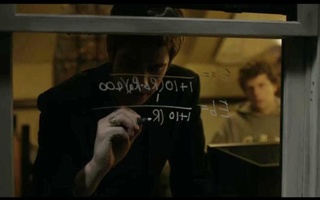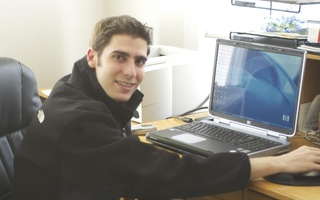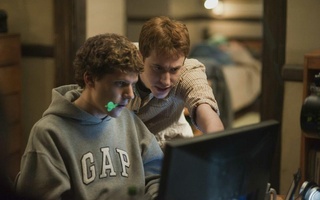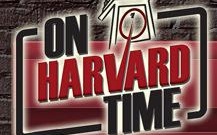DOWN TO THE LAST DROP
Mezrich’s dramatic writing style may be one of the reasons his 14-page book proposal captured Sorkin’s attention. Before Mezrich even began serious work on the book, his publisher circulated the proposal around Hollywood, where it quickly caught Sorkin’s eye. “When I was on page three, I said ‘yes’,” Sorkin says. “It’s the fastest I’ve ever said ‘yes’ to anything.”
The following months saw the two writers working concurrently on the their respective projects, composing two similar but essentially distinct stories. “Ben and I began at the same time. We were working separately but along parallel paths of research and then writing,” says Sorkin.
Sorkin insists on the veracity of his work: “Attention to truth and attention to detail were incredibly important to us,” he says. “When the truth was absolute and the truth was known, we gave you the truth.” In the scene where Zuckerberg creates Facemash, Sorkin adds, Zuckerberg is drinking Beck’s beer—the brand confirmed as the actual brand of beer he drank that night. Sorkin stresses how important their inquiries were, noting the exhaustive amount of research it takes to recreate such minutiae. “The fact that we know what kind of beer he was drinking on a Tuesday night in October seven years ago when there were only three other people in the room should tell you something about how close our... research sources were to the subject in the event,” says Sorkin.
Sorkin is also careful to point out that disputed claims do not detract from the movie’s status of as a work of non-fiction. “It’s absolutely non-fiction,” he says. “There were two lawsuits filed against Facebook at roughly the same time… What emerged were three very different versions of the story. Instead of picking one and deciding that’s the truth, I liked that there were three different versions of the truth. It is non-fiction about facts that are in dispute… The movie doesn’t take a position on what the truth is.”
While the Sorkin’s script largely follows the trajectory of Mezrich’s book, Sorkin seems to have taken a much stronger interest in Zuckerberg. The product is a much more sympathetic approach to Zuckerberg’s character. “I can’t write characters that are built out of one-dimensional evil,” he says. “I have to like the character and be able to empathize and identify with the character.”
To this end, Sorkin’s take on Zuckerberg is not that of a man singularly obsessed with Facebook, but that of a deeply flawed antihero who acts out of insecurity rather than greed. Sorkin praises actor Jesse A. Eisenberg for his portrayal of Zuckerberg. “[He] never judges the character, never comments on the character, and never asks the audience to like him,” Sorkin says. “So that’s an incredibly courageous performance.”
CHARACTER SHOES
“I really tried to kind of understand who the real person was to help me prepare for the character.” Eisenberg’s words read as an understatement when one considers the pains he went through to emulate Zuckerberg effectively on camera. According to Eisenberg, his preparation for the role involved extensive research of Zuckerberg’s mannerisms and speech through pictures, videos, audio, and interviews he found. Eisenberg also took fencing lessons because Zuckerberg had been a fencer in high school—“I wanted to emulate that posture,” Eisenberg says. He even obtained Zuckerberg’s application to Harvard.
“Aaron Sorkin’s characterization of Mark was thorough and rich and nuanced in every way you want a character to be,” Eisenberg says. He adds that he felt a sense of sympathy toward the character of Zuckerberg. “I can only view him sympathetically because that’s what I was hired to do,” said Eisenberg, “I spent six months, 14 hours a day in his shoes.”
Armand D. Hammer, who played the Winklevoss twins in the film, expressed similar sentiments about Sorkin’s characterizations. “There’s not really a villain in this film. There are occasional moments when each character becomes an anti-hero… Each character has that sort of relatable sense of being a real person in a real situation.”
Thus the cast of the film engaged in a great deal of deeply personal work to portray their real characters authentically. However, both Hammer and Eisenberg seemed hesitant to judge how truthful or how dramatized the overall product was. They cite Sorkin’s script as their primary point of reference while building performances, and seem reluctant to comment on how dramatized or factual the events of the movie actually are. When asked about such issues, Eisenberg replied matter-of-factly, “I’m happy to not have to account for that.”
VERITAS ET VANITAS
While certain aspects of the film have raised questions of factuality—be it the characters, plot, or overall tone—there is no question that “The Social Network” recreates the environment of Harvard in a stunningly accurate and excruciatingly detailed manner. The film is peppered with minute, but meticulously-crafted details that may only be appreciated by a Harvard audience.
The script is replete with Harvardisms—at one point, Mark Zuckerberg abruptly corrects his girlfriend when she mistakenly refers to the Phoenix S.K. Club as a ‘finals club’ instead of a ‘final club.’ The production design also does a remarkable job of recreating Harvard with excruciating accuracy—from editing the tower of Memorial Church into scenes shot at Johns Hopkins University, right down to the regulation “DO NOT USE FIREPLACE” sticker on Zuckerberg’s mantle, “The Social Network” spares nothing in its pursuit of recreating Harvard with total precision.
Read more in Arts
Margot & the Nuclear So and So’s Hit Growing Pains


















